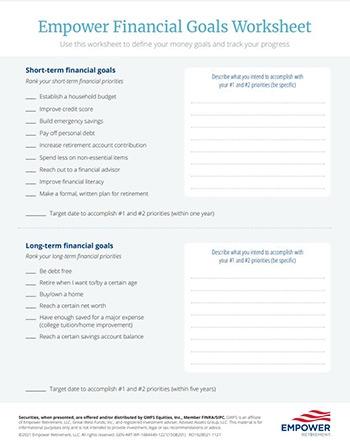
How to plan your retirement
Prepare for your golden years with a written financial plan
Have you ever gone shopping for groceries without a list? If you’re an impulse buyer, there’s a good chance you may have left your local supermarket with a basket full of extra — and extraneous — salty snacks, tasty treats and personal products.
In other words, without a written plan in place, you could end up paying a high price for not being prepared.
Think of your retirement readiness the same way.
Empower Retirement research reveals that developing a written financial plan can serve as a recipe for savings success as you advance in your career.1 In fact, people who produce a plan for retirement are on track to replace nearly 100% of their working income when they’re older compared to only 62% for those who have yet to build a detailed blueprint. By jotting down your own long-term goals, hopes and priorities for your future, you can follow a more fruitful financial path, too.1
Here are five must-have items to ponder, document and eventually add to your cart of essentials for retirement. Be sure to revise and update as you move along in your financial journey.
1. Set a date
Whether you’re in the early stages of your profession, on the middle leg of your journey or on the homestretch run, your post-working days will be here before you know it. Right now, the average retirement age is around 64 years old, depending on individual factors like location, physical condition and environment.2
Use this opportunity to set a date for when you’d like to cross your finish line into retirement. Having a tangible time frame can help you identify any gaps in your estimated monthly income, keep pace with your savings target and take any strategic steps to protect your nest egg.3
2. Determine your expenses
Think ahead to your golden years. How much money do you need in retirement?
Based on the lifestyle you imagine for your future, what bills are you anticipating to manage on a regular basis? While deferring at least 10% of your current salary to your retirement program is recommended,4 determining your expected expenses now can help you select a contribution rate that meets your needs later.
Empower’s retirement calculator can help you determine how much money you might need to fund your golden years.
3. Understand your projected Social Security payments
Age plays a critical role in when you become eligible to collect Social Security benefits. As soon you celebrate your 62nd birthday, you can receive your normal installments — even if you’re still employed.5 But, for each year you delay your request, your total amount may increase by 7%-8% until you turn 70.6,7
Log on to ssa.gov to access your account, evaluate your earnings history and view your projected payments.
4. Research where you want to live
Where do you envision yourself enjoying your hobbies, making new memories and living out your dreams?
Florida, California and Arizona will likely pop in your head if you have a passion for warm weather and sunshine. But maybe you imagine relaxing in the heartland in, say, Nebraska, Missouri or Iowa, which are picking up steam and becoming their own retirement hot spots.8 Or, of course, you can also choose to remain right where are you and stay home sweet home when your career comes to a close.
Regardless of whether you crave a change of scenery or prefer the same ZIP code you have today, start painting a picture of where you want to reside so you can move toward your desired destination.
5. Choose what you’ll do
Lying on the beach. Hiking in the mountains. Sightseeing overseas. If you’re like the almost 40% of Americans who want to explore the world in retirement, you may already be plotting your next big adventure.9
But, if traveling isn’t your thing, how will you map out an active itinerary when you no longer have a typical workweek? Most retirees agree that retirement opens the door to exciting experiences. Whether you have an interest in volunteering, gardening or golfing, establishing a productive routine can lead to a stronger social portfolio after you depart your full-time job.10
Writing down your short-term and long-term financial goals can help you make progress toward the future you imagine.
Start formalizing your future with our financial goals worksheet.
1 Empower Institute, “Scoring the Progress of Retirement Savers 2020,” September 2020.
2 Yahoo Finance, Rachel Cautero, “When Do People Retire on Average,” February 2020.
3 CNBC, Lorie Konish, “At or near retirement? Consider these moves to protect your nest egg,” March 2020.
4 CNN Business, “Ultimate Guide to Retirement,” October 2020.
5 USA Today, “What's the most popular age to take Social Security? A Foolish Take,” June 2018.
6 ssa.gov
7 Empower Retirement, “Let’s talk retirement,” May 2020.
8 NBC News, Nicole Spector, “Sorry, Florida. According to a new report, these Midwestern states are the best places to retire,” June 2019.
9 Empower Institute, “Rethink, Rewire, Retire,” October 2019.
10 Stanford Center on Longevity, Amy Yotopoulos, “Social Portfolios are Just as Important as Financial Portfolios,” 2016.
RO1947485-1221




